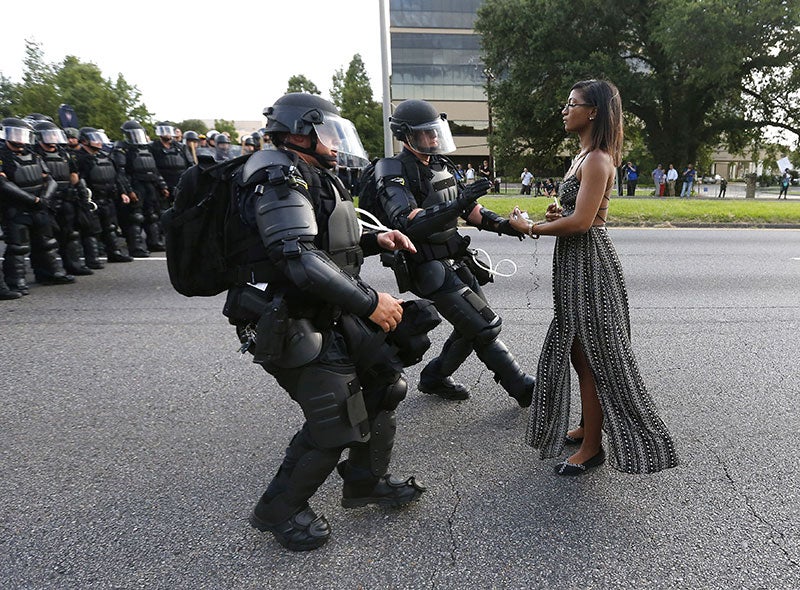
On February 20, former NFL player turned filmmaker Matthew Cherry honored the resilience, fortitude and courage of Black women by posting several photos of Black women ‘unbothered’ by the police on Twitter.In response, men and women of all races and backgrounds affirmed Cherry’s sentiments by posting photos of other Black women peacefully resisting police.
The names of the women highlighted in Cherry’s post were unknown, as were many of the names of the women shared by those responding to his post. This isn’t unusual.
Throughout history women have played integral roles in the success of social and civil movements. Women like Diane Nash, Mary McLeod Bethune and Dorothy Height – and countless others – initiated, planned and fully implemented the movements with little to no recognition. Often times, the movements they helped plan and represent stopped short of even addressing the issues affecting Black women.
Still, they persisted.
Their persistence, belief in, and support of social movements demonstrates the importance of Black women in the struggle for equity, says Hip Hop Caucus President and CEO Rev. Lennox Yearwood, Jr.
“I was so blessed to be mentored by Dr. Dorothy Height. She not only believed in our people, but supported our movement every single day. As a young African-American man, it was an honor to see her work up close, and her vision for people of color. More importantly, I was able to see the amazing power of women and how important they are within our struggle and our success.”
As we celebrate Women’s History Month continue to shed light on the lack of recognition for the countless contributions of Black women, her are the little known stories of five compelling Black women who have stood bravely in the face of obstacles, helping to carve out a small piece of the American pie for our communities.
Elizabeth Jennings Graham was a Black teacher who was thrust into civil rights activism when she insisted on her right to ride on an available New York City street car. At the time, all such companies were privately owned and most operated segregated cars. Her case was decided in her favor in 1855, and it led to the eventual desegregation of all New York City transit systems by 1865. In addition, in 1867, Graham started the first Black kindergarten in her home. It operated until 1901.
Josephine St. Pierre Ruffin was a bi-racial Bostonian who fought tirelessly for women’s rights, particularly the rights of Black women. Ruffin, along with two other women, founded the American Suffrage Association and started Women’s Era, the country’s first newspaper published by a Black woman. The newspaper promoted interracial issues, but also called on Black women to demand equal rights for their race. In addition, she was a co-founding member of the National Association for the Advancement of Colored People, was integral in organizing several other women’s advocacy organizations and convened The First National Conference of Colored Women.
Mary Church Terrell was an activist during the women’s suffrage movement who often spoke out against the movement’s exclusion of Black women. In 1896, she co-founded the National Association of Colored Women and was named the organization’s first president. A charter member of the National Association for the Advancement of Colored People, Terrell was also the first Black woman ever appointed to a school board and served on a committee that met to investigate allegations of police brutality. After the ratification of the 19th Amendment, Terrell continued her activism by joining the fight against Jim Crow laws. In 1949, she became the first Black woman admitted to the Washington (DC) chapter of the American Association of University Women and worked with several other activists to sue an establishment that refused service to Black people. The lawsuit laid the foundation for the eventual court order that ruled all segregated restaurants in Washington, DC were unconstitutional.
Anna Arnold Hedgeman may be best known for her role as executive director of Harry Truman’s 1948 presidential campaign, but her civil rights activism started much earlier. In fact, Hedgeman, who once served as the Dean of Women at Howard University, was forced to resign from her position as director of the Brooklyn YWCA because of her protest activities and militancy. Her forced resignation led to a more active civil rights career, which included co-founding the National Organization for Colored Women; being the first African-American woman to hold a mayoral cabinet position in the history of New York City; and serving as an organizer for the March on Washington for Jobs and Freedom. She also served on the National Council of Churches on the Commission on Religion and Race. She used her position with the organization to explain to white Christians why racism went against their religion. It is said that she also used this position to recruit 40,000 Protestants to the March on Washington.
Subscribe to our daily newsletter for the latest in hair, beauty, style and celebrity news.
Ella Baker was a civil and human rights activist who worked largely behind the scenes as an organizer for more than five decades. A proponent of grassroots organizing and radical democracy, Baker played key roles with the National Association for the Advancement of Colored People, the Southern Christian Leadership Conference and the Student Non-Violent Coordinating Committee. In 1930, she joined the Young Negroes Cooperative League, whose purpose was to develop Black economic power through collective planning. She also involved herself with several women’s organizations. She was committed to economic justice for all people and once said, “People cannot be free until there is enough work in this land to give everybody a job.”
